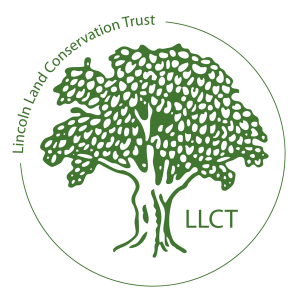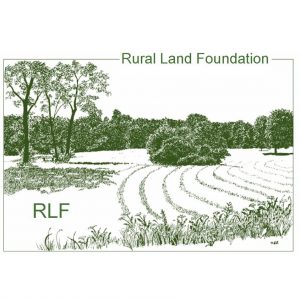In advance of the HCA community forums and December Town Meeting, RLF has prepared a series of frequently asked questions (and answers) about the organization.
What is the RLF? What is the LLCT?
“…let us set out in the hope that our descendants may say it has been not less well with them than it was with us and with our fathers. It is a goodly land; and may they in their day feel blest in its possession, no less than do we in ours.”
– Charles Francis Adams in his 1904 Anniversary Address in Lincoln
Out of this belief was born the mission of both the Rural Land Foundation (RLF) and the Lincoln Land Conservation Trust (LLCT): to preserve the rural character of Lincoln. Since the mid-20th century, the two Lincoln-based non-profit organizations have played important roles in helping Lincoln face development head on to protect the town’s legacy of open space, agriculture, and recreation.
The RLF’s main activities include leading creative land planning projects that balance open space preservation with other Town needs such as housing. RLF also owns and operates the Mall at Lincoln Station for the benefit of Lincoln residents. The RLF’s conservation activities are funded by proceeds from the Mall at Lincoln Station, and through private donations at the time of land acquisition.
The RLF and its sister organization, the Lincoln Land Conservation Trust (LLCT) work together to acquire, protect, and steward conservation land in Lincoln. They share the same set of Trustees (17 Lincoln residents), staff, and office space. For many conservation acquisition projects, RLF will make the initial land purchase and then donate the conservation land to LLCT or a public agency such as the Town to be held in perpetuity. Proceeds from the Mall are the main source of support for both organizations’ missions.
Why does the RLF own the Mall at Lincoln Station?
In the early 1970’s a 71- acre portion of the Codman Estate came on the market and RLF stepped in to purchase the land on behalf of the Town. RLF then spent the next several years working with the Town and the Lincoln Foundation (a non-profit housing organization) to develop a creative land development and conservation plan for the property. The implementation of the plan resulted in 55 acres of land (including Farm Meadow, used by Codman Farm) conserved, 12 acres of land deeded to the Lincoln Foundation for the development of low- and moderate-income housing (Lincoln Woods), and 4 acres of land set aside for commercial development (the Mall at Lincoln Station) which helped pay for the land acquisition. RLF worked with a developer to create the Mall at Lincoln Station through a ground lease option. That Option enabled RLF to purchase the property back from the developer and it did so in the late 1980’s to help the town maintain control over its commercial center. Since that time the RLF has owned and operated the Mall for the benefit of Lincoln residents with proceeds from the Mall funding its land conservation activities. (For more detailed information on the Codman Land purchase see this conservation story.)
How has the RLF benefited the town?
The RLF was founded in 1965 with the purpose of strategic real estate development that prioritized land conservation. In the nearly sixty years since its inception, RLF has played a key role in helping Lincoln protect its legacy of open space while ensuring the 20th and 21st century needs of its residents are met.
RLF’s first such development project is emblematic of its mission. RLF purchased the 109-acre Wheeler Farm to develop 10 clustered residential lots and conserve 50 acres of open space. Since then, RLF has led numerous conservation projects, helping to preserve nearly 40% of Lincoln for the public benefit.
More recently, RLF helped to secure the development of the 16-acre Wang property located at 100 Bedford Rd. This $2 million plus multi-use project included three acres for a new athletic field for the town, four acres to serve as the new home for the Birches School, a nature-based micro school, and nine acres to be placed into conservation, with land management provided by LLCT and the Town.
Today, RLF continues to play the role of strategist, helping the Town of Lincoln shape its future by continuing to embrace smart development and, through acquisition, to secure conservation opportunities that would otherwise be lost. The combined dedication of staff, trustees, members, and volunteers, coupled with the generosity of public and private donors and Mall proceeds, ensures that the work we do continues to preserve the rural character that has made Lincoln a haven of open space for generations and will continue to do so for years to come.
Why does the RLF want to rezone the Mall?
RLF would like to rezone the Mall to ensure the viability of commercial space in Lincoln now and in the future. The RLF’s Trustees also believe that creating the opportunity for mixed-use development, i.e. allowing housing, will increase the financial stability of the site and meet the Town’s need for more affordable and moderately priced housing.
RLF is seeking rezoning rather than going through a Town Meeting process to approve a redevelopment project. The primary reason for this is that Town Meeting is a lengthy, expensive, and highly uncertain process. If we do not rezone, then we will be competing with Housing Choice compliant towns all around us that allow mixed use development by right.
In the early 2000’s, when the Post Office wanted to leave and Donelan’s was requesting a larger space, the RLF invested over $1.5 million of its endowment and took out a loan for several million dollars to keep the Post Office at the Mall and preserve the viability of a grocery store in Lincoln. RLF went through a lengthy Town Meeting process for approval, and the delays almost cost the project its viability.
Since the Mall’s inception, the RLF has continually reinvested in the space and its retail tenants and has tried to maintain a mix of retail that meets residents’ needs. This has included the RLF responding to the reinvestment needs of a stream of restaurants, as well as the rebuild of the Donelan’s roof after its collapse in 2011 due to historic heavy snows. At the time, the Town was without a grocery store for well over a year as Donelan’s debated whether to return. RLF searched for other grocery stores and quickly found that our rural density precludes most grocery stores from even considering a Lincoln location. Fortunately, we were able to negotiate with Donelan’s and convince them to stay, but the town was very close to not having a local food shopping option. RLF’s Trustees see rezoning the Mall as the first step towards an even more profound reinvestment into Lincoln’s commercial center and as an important way to continue to fulfill RLF’s and LLCT’s missions.
Lastly, RLF is seeking the rezoning to increase the site’s value to ensure its ability to continue its conservation work. Such an improvement in value would result in renewed and higher- quality commercial space, the creation of housing, and the support of existing commercial space through the negotiated sale or lease of the Mall. Proceeds would also go towards paying down the RLF’s mortgage and, hopefully, towards funding an endowment that would back the RLF’s and LLCT’s continued conservation activities in Lincoln in support of the Town’s Open Space and Recreation Plan as well as other conservation opportunities that may arise. The goal is to be able to continue our conservation activities with the same creativity, vigor, and determination we have deployed from the beginning of our organizational history through the present day and well into the future.
Why don’t we just make the Mall an HCA subdistrict?
The Town and the RLF are committed to ensuring a vibrant retail center in Lincoln. The original HCA guidelines did not allow Towns to require commercial space within the HCA zoning. Therefore, although the Housing Choice Act Working Group has consistently proposed rezoning the Mall concurrently with the HCA zoning, the Mall area did not originally count as part of the HCA proposal. However, in August, the State revised the HCA guidelines and will now allow up to 25% of the Town’s required zoning unit capacity to come from a mandatory mixed-use housing district (MMU). Now, rezoning the Mall as part of the Village District contributes 125 zoned units out of the 635 for which Lincoln must zone.
Why is Mall redevelopment important?
Mall redevelopment will:
- Help address the regional housing crisis, providing an attractive and moderately priced “transit oriented” option for the community.
- Refresh the commercial area of the Mall, improving the space for existing and future tenants.
- Support RLF’s continued ability to spearhead conservation projects in Lincoln, and the organizational support needed for the RLF’s and LLCT’s activities.
- Support RLF’s climate change policy by ensuring new buildings meet the stretch code and by demonstrating a commitment to public transportation.
Why is Mall redevelopment challenging?
Redeveloping the Mall is challenging for a number of reasons:
- The site is compact and the demands on it are high. A design needs to be attractive but also functional. For example, there must be adequate parking and safe turning radii for delivery trucks.
- RLF respects its tenants and their lease structures. RLF would need to be considerate of tenants’ wishes and ensure minimal interruption to their operations.
- Changing market conditions. Retail is hard to predict. Tenants may not renew their leases or may request more or less space in the future.
Has the RLF chosen a developer to redevelop the Mall?
- No, the RLF has not chosen or contracted with a developer. RLF has been working with CIVICO to develop a vision for the Mall that is attractive and financially viable.
- RLF is also engaging a design firm to depict a few design ideas that will be shared with the Town before the Annual Town Meeting. The Town will be invited to share feedback.
- If the rezoning passes at Town Meeting, RLF will seek further design input from Town residents and officials before putting the designed project out to bid.
- The RLF does not have the funds to redevelop the Mall itself, it must partner with a developer.
- This could be a sale or a 100-year ground lease of the property. Any such sale or lease would be conditioned on the design ideas that were shared with the Town residents at Annual Town Meeting and through public forums after Annual Town Meeting.
Why does the RLF feel it is appropriate for the Town to apply for a MassWorks grant to help defray the costs of the Wastewater Treatment Plant (WWTP) upgrade at Lincoln Woods?
The Mall currently uses the services of the WWTP owned by The Community Builders (who own Lincoln Woods). The RLF believes that both Lincoln Woods and the Mall at Lincoln Station contribute to the broader public good of the Town of Lincoln as well as the thousands of constituents served by these two entities more directly. The State welcomes such grant applications and clearly sees the public benefit of these sorts of redevelopment efforts as well.
Importantly, the receipt of one grant does not preclude the Town from receiving another. For example, the Water Department would still be able to apply for a grant to defray the cost of the water main replacement between Bedford Rd tank and Rt 117. However, if the Town does not approve the HCA zoning, it will not be eligible for such MassWorks grants.

